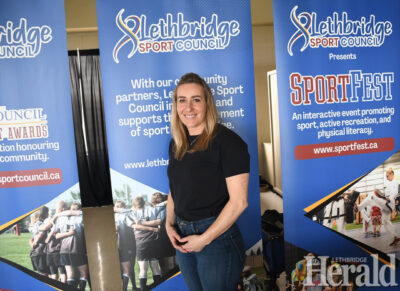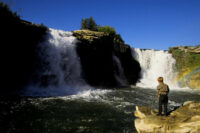Olympian discusses ‘Safe Sport’ at workshop
By Justin Seward - Lethbridge Herald on April 30, 2024.
 Herald photo by Justin Seward
Allison Forsyth spoke about what she does to advocate for Safe Sport during a workshop on Saturday at the Rocky Mountain Turf Club.
Herald photo by Justin Seward
Allison Forsyth spoke about what she does to advocate for Safe Sport during a workshop on Saturday at the Rocky Mountain Turf Club.LETHBRIDGE HERALDsports@lethbridgeherald.com
Two-time Olympic alpine skier Allison Forsyth was at the Rocky Mountain Turf Club to speak at the Lethbridge Sport Council -led Safe Sport workshop on Saturday.
The focus of the workshop was to make organizations aware of what they can do and should do in regards to Safe Sport.
Forsyth, who was also on the Canadian World Cup team for 10 years, was a survivor of abuse in that period.
“My passion for Safe Sport came from my lived experience of abuse in high performance sport in our country, and that’s why now I’m quite literally travelling the country and getting into a lot of local organizations, national organizations to educate around Safe Sport,” said Forsyth.
Forsyth was one of many teammates that was sexually abused by her coach.
“It was what we consider in Safe Sport to be a predatorial abusive thing, much like the Larry Nassar case out of USA gymnastics, and it was covered up directly by our organization back then,” said Forsyth.
“So he wasn’t caught for 17 years and so once he finally was caught, we went to a criminal trial and he was sentenced to 12 years in prison. And just through that with the trauma and the experience of the cover up I just became a very strong advocate to prevent what happened to me from happening to other people.”
Forsyth has been working Safe Sport for six years.
“Now I recognize working in this space and advocating in the space of safe sport for six years, it’s much more than just what happened to me,” said Forsyth.
“There’s a lot of other forms of maltreatment that we need to educate on and prevent.”
Forsyth does online education, works directly with organizations to assist with putting in place Safe Sport policies and practices.
“I love coming out to our communities,” said Forsyth.
“So that’s why I literally come. I think it’s really important to build relationships and talk to local organizations and make it not scary. I think that people think of safe sport as a scary topic because there’s not a lot understood about it yet. So when I work with organizations, I make sure they know that I’m respectful, I know they’re not doing anything wrong to try to abuse kids, or allow coaches to abuse kids or allow kids to abuse kids. But they need to understand how to put in the proper prevention mechanisms.”
She talked about predatorial abuse, which is when athletes are targeted by someone coming into an organization to cause harm and mostly sexually.
The other form of maltreatment that Forsyth touched on was the cultural normalization of maltreatment such as bullying, hazing and exercising as a form of punishment like bag skating.
“So that’s critical because over 95 per cent of cases we currently see is from that,” said Forsyth.
She spoke on what is called the pyramid of harm.
“So the pyramid of harm is where we just have to acknowledge that when we let one thing be OK, it lets the next level of harm be OK, so if we let a microaggression be OK,” she said.
“Like in sports, to make it more real, trash talking or chirping is largely accepted where the kids make fun of each other. Well, if we let that be OK, before we know it, they’re bullying each other, which is the next level.”
While she doesn’t necessarily think about the impact she has, it’s more about the commitment of doing it.
“The way that I am is very organic, and real and in conversation, and the biggest impact I hope to have is that I am someone who will be a resource for anyone that wants to talk about this,” she said.
“Because just through being in the space for six years, I have so much knowledge expertise in my brain that I just want to help people understand.”
24-23




